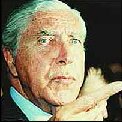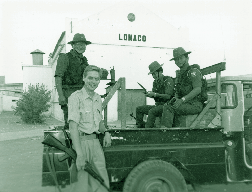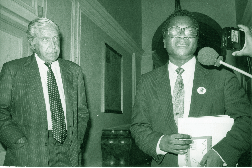
Company
History |
|
Lonrho
Africa, since March 1999 trading as Lonmin
Plc., has decided to desert
Africa for more profitable ventures elsewhere.

Wegen anhaltend schlechter
Ertragslage hat Lonrho Africa entschieden, sein
Engagement auf dem Kontinent ganz aufzugeben und
verbleibende Unternehmen zu verkaufen. |
| |
|
|

Tiny Rowland † |
|
Lonrho
Africa was orignially an unprofitable mining firm
in Southern Rhodesia, now Zimbabwe. It was turned
into a multibillion dollar conglomerate spanning
more than 60 countries by the late business
tycoon, Tiny Rowland. The extent of the influence
exerted in Africa by Mr Rowland and Lonrho became
highly controversial in the 1970s. Former British
prime minister Sir Edward Heath described him as
"the unpleasant and unacceptable face of
capitalism". Mr Rowland's expansive
ambitions also saddled the firm with a heavy debt
burden, eventually leading to his ousting from
the boardroom in 1993. |
| |
|
|
| |
| |
| |
| |

LOMACO, a joint venture
with the government, became one of the
biggest tomato-growers in the southern
hemisphere.The expanding war in
Mozambique made Lonrho's £53 million
business interests in tomato, tea and
cotton farming, gold mining, an oil
pipeline and hotels increasingly
unprofitable. |
| |
| |

Renamo leader
Afonso Dhlakama (right) with 'Tiny'
Rowland after an informal meeting with
President Chissano, Rome, August 1992 Credit:
Joel Chiziane/AIM
|
|
|
‘Tiny’
Rowland,
Financial Incentives and the Mozambican
Settlement
By
Alex Vines
The strong interest
demonstrated in the role of the church and
various diplomatic initiatives in bringing about
an end to Mozambique’s war has led to a
number of other critical factors being
underplayed. It is well known, for instance, that
the severe drought which hit Southern Africa in
the early 1990s dramatically raised the costs for
both sides of continuing the war. Less well
understood is the extent to which the peace
process was paved with incentives — largely
financial in nature — which made the final
settlement possible...
...‘Tiny’ Rowland, then chief executive
of the UK-based multi-national, Lonrho, started
making protection payments to Renamo during the
early stages of the war to protect Lonrho’s
agricultural and industrial investments. When
this strategy failed, Rowland became personally
engaged in the peace process and was instrumental
in building up Renamo’s confidence to step
out of the bush and negotiate. His support would
not be enough, however, to ensure that Mozambique’s
peace settlement held. Additional financial
inducements were needed to secure Renamo’s
continuing commitment to the peace agreement, and
came mainly from the Italian government.Tiny
Rowland first became involved with Mozambique in
the early 1960s when he negotiated the building
of an oil pipeline from the port of Beira to
Southern Rhodesia for Lonrho. The pipeline was
opened in December 1964 and for the next three
decades was Lonrho’s primary asset in
Mozambique. When the security of the pipeline was
threatened in the early 1980s, in the context of
the expanding war between the Mozambican
government and the South African-backed Renamo
insurgents, Lonrho entered into direct contact
with Renamo to arrange a deal.
In June 1982, a Lonrho subsidiary signed a secret
protection agreement with Renamo leaders covering
the Beira oil pipeline. The agreement stipulated
that payments of US $500,000 would be made to
Renamo each month from June to August, to be
continued indefinitely thereafter, unless either
party gave one month’s notice to terminate
the arrangement. These payments were made into
foreign bank accounts controlled by a number of
Renamo’s senior internal leadership. Later,
additional agreements were reached covering
Lonrho’s tea estates in northern Mozambique.
These latter payments continued up to the signing
of the General Peace Agreement (GPA) in Rome in
October 1992 and amounted to some US $5 million...
|
| |
|
|
| |
| |
| |
 |
| |
 |
| |
| The gold
operation at Obuasi, 200km north west of
Accra in Ghana, is the major asset of
Ashanti Goldfields Company (AGC),
established in London in 1897. AGC
started underground mining in 1907 and,
in the mid-1980s, launched a capital-intensive
mechanisation programme that was
completed during 1998/9. This project was
intended to allow gold production of 850,000oz/y
but, in 1999, depressed gold prices and a
$450 million hedging liability obliged
Ashanti to revise mine planning targets.
In future, gold output will be 550,000–650,000oz/y
at a cash cost below $200/oz. AGC has
reduced staffing at Obuasi from
approximately 10,000 in 1996 to 7,400 in
mid-2000.Lonrho purchased AGC in 1969.
The Ghanaian Government reduced its
holding to 19.8% via a flotation in 1994,
leaving Lonrho (now Lonmin) holding a 33%
stake with corporate and private
investors holding the remainder. In mid-2001
the Ghana Mining Commission recommended
that the state should dispose of its
“golden share”.
|
| |
 |
|
|
Die
Akte Ashanti
Über Tiny Rowland und den fehlgeschlagenen
Versuch von Lonmin, die Mehrheit bei der Ashanti-Goldmine
in Ghana zu erwerben
aus den "Gold-Seiten" von: Kai
Peter Joens
 ...Unter
allen Firmen des Vereinigten Königreichs genoß
Lonrho PLC den zweifelhaften Ruf als eines der
skrupellosesten Unternehmen wenn es um die
Durchsetzung von Wirtschaftsinteressen ging. Maßgeblich
beteiligt an dieser Firmenpolitik der "London
and Rhodesian Mining Company" war ihr
ehemaliger Chairman und Großaktionär Tiny
Rowland. Wie kein Zweiter beherrschte Rowland die
Kunst der Täuschung und der Intrige. Er verstand
es, aus dem kleinen Kolonialgemischtwarenhandel
Lonrho eines der schlagkräftigsten Bergbau- und
Handelsunternehmen des Britischen Empires zu
machen. Er war ohne Frage in der Lage, einem
afrikanischen Stammeshäuptling wertvolle
Bergbaurechte für ein paar Glasperlen
abzuschwatzen und ihn dabei im Glauben zu lassen,
ein gutes Geschäft gemacht zu haben. Ich
distanziere mich davon, Rowland als Gauner zu
bezeichnen, da ich eine gewisse Sympathie und ein
Maß an Respekt für die Leistung dieses Mannes
nicht verhehlen kann (der Begriff Schlitzohr wäre
angebrachter). Trotz seines geschäftlichen
Erfolgs wurde er nie von der britischen
Oberschicht toleriert (diese Portwein schlürfenden
und auf Pferde wettenden Dummschwätzer haben
eben keine Sympathien für einen Mann dieses
Formats), der ehemalige kongolesische Präsident
Lumumba ging sogar so weit, ihn als "unacceptable
face of capitalism" zu bezeichnen. Wenn man
sich die eher plumpen Verhandlungsversuche von
Lonmin (als Nachfolgegesellschaft von Lonrho`s
Bergbauaktivitäten) ansieht, so wird klar, daß
diese Herren scheinbar nichts von Rowland gelernt
zu haben scheinen. Obwohl Lonmin mit 32 % Großaktionär
von Ashanti ist, haben die Herren aus London
durch simple Gier (sie wollten schlicht zu wenig
für die Übernahme von Ashanti zahlen) oder
durch Dummheit ihre Position als bevorzugter
Bieter für Ashanti zumindest vorläufig
verspielt und den Weg frei für andere
Interessenten wie Anglo Gold, Barrick, Placer
Dome, Harmony oder Gold Fields gemacht. Ein
solcher Kardinalfehler wie die Abgabe eines öffentlichen
Übernahmeangebots ohne sich vorher die Unterstützung
des Großaktionärs und Mitbestimmers Ghana
einzuholen, ist schlichtweg dumm und wäre einem
Mann wie Rowland niemals unterlaufen. Lonmin`s
Management scheint nicht mitbekommen zu haben, daß
die Tage des Britischen Empires gezählt sind,
und daß Geschäfte in Kolonialherrenmainier nach
dem Motto "Friß oder Stirb!" in der
heutigen Zeit schlichtweg nicht mehr zu machen
sind. Anstatt ein für alle Parteien faires und
vernünftiges Angebot auf den Tisch zu legen, hat
Lonmin sein ursprüngliches Angebot nach unten
revidiert und damit sowohl die ghanaische
Regierung als auch die restlichen freien Aktionäre
gegen sich aufgebracht... ...Unter
allen Firmen des Vereinigten Königreichs genoß
Lonrho PLC den zweifelhaften Ruf als eines der
skrupellosesten Unternehmen wenn es um die
Durchsetzung von Wirtschaftsinteressen ging. Maßgeblich
beteiligt an dieser Firmenpolitik der "London
and Rhodesian Mining Company" war ihr
ehemaliger Chairman und Großaktionär Tiny
Rowland. Wie kein Zweiter beherrschte Rowland die
Kunst der Täuschung und der Intrige. Er verstand
es, aus dem kleinen Kolonialgemischtwarenhandel
Lonrho eines der schlagkräftigsten Bergbau- und
Handelsunternehmen des Britischen Empires zu
machen. Er war ohne Frage in der Lage, einem
afrikanischen Stammeshäuptling wertvolle
Bergbaurechte für ein paar Glasperlen
abzuschwatzen und ihn dabei im Glauben zu lassen,
ein gutes Geschäft gemacht zu haben. Ich
distanziere mich davon, Rowland als Gauner zu
bezeichnen, da ich eine gewisse Sympathie und ein
Maß an Respekt für die Leistung dieses Mannes
nicht verhehlen kann (der Begriff Schlitzohr wäre
angebrachter). Trotz seines geschäftlichen
Erfolgs wurde er nie von der britischen
Oberschicht toleriert (diese Portwein schlürfenden
und auf Pferde wettenden Dummschwätzer haben
eben keine Sympathien für einen Mann dieses
Formats), der ehemalige kongolesische Präsident
Lumumba ging sogar so weit, ihn als "unacceptable
face of capitalism" zu bezeichnen. Wenn man
sich die eher plumpen Verhandlungsversuche von
Lonmin (als Nachfolgegesellschaft von Lonrho`s
Bergbauaktivitäten) ansieht, so wird klar, daß
diese Herren scheinbar nichts von Rowland gelernt
zu haben scheinen. Obwohl Lonmin mit 32 % Großaktionär
von Ashanti ist, haben die Herren aus London
durch simple Gier (sie wollten schlicht zu wenig
für die Übernahme von Ashanti zahlen) oder
durch Dummheit ihre Position als bevorzugter
Bieter für Ashanti zumindest vorläufig
verspielt und den Weg frei für andere
Interessenten wie Anglo Gold, Barrick, Placer
Dome, Harmony oder Gold Fields gemacht. Ein
solcher Kardinalfehler wie die Abgabe eines öffentlichen
Übernahmeangebots ohne sich vorher die Unterstützung
des Großaktionärs und Mitbestimmers Ghana
einzuholen, ist schlichtweg dumm und wäre einem
Mann wie Rowland niemals unterlaufen. Lonmin`s
Management scheint nicht mitbekommen zu haben, daß
die Tage des Britischen Empires gezählt sind,
und daß Geschäfte in Kolonialherrenmainier nach
dem Motto "Friß oder Stirb!" in der
heutigen Zeit schlichtweg nicht mehr zu machen
sind. Anstatt ein für alle Parteien faires und
vernünftiges Angebot auf den Tisch zu legen, hat
Lonmin sein ursprüngliches Angebot nach unten
revidiert und damit sowohl die ghanaische
Regierung als auch die restlichen freien Aktionäre
gegen sich aufgebracht... |
| |
|
|
|